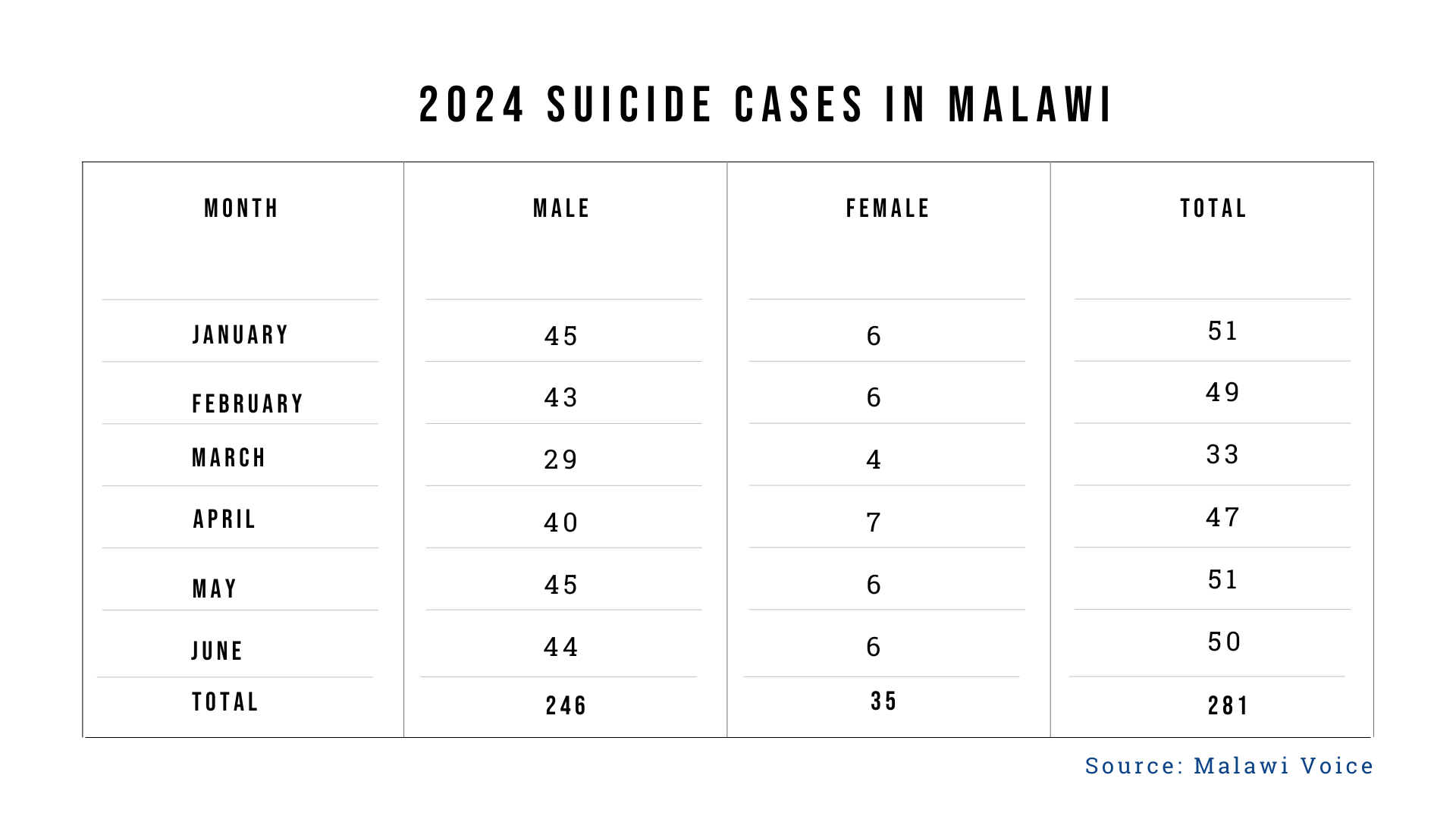Breaking the Silence: Addressing the Rising Suicide Rates in Malawi
Why Mental Health Support is Crucial Amid Malawi’s Rising Suicide Rates

The World Health Organization (WHO) defines suicide as a death resulting from self-directed behaviour with the intent to die. It is a leading cause of death worldwide, particularly among young people coming second only to road traffic accidents.
In Malawi, incidents of suicide are unfortunately on the rise. A report released by the Malawi Police Service (MPS) in September shows the country has registered an increase in the number of suicide cases in the first half of 2024, as compared to those registered during the same period in 2023. In the first half of 2023, Malawi registered 256 cases of suicide, as compared to 135 people who committed suicide during a similar period in 2022, representing a 100 percent rise in the number of cases. In 2024, the situation is even worse. Between January and June 2024, 281 people died by suicide, a 20% increase from the same period in 2023. The records further show that more men have killed themselves in 2024 as compared to women. Of the 281 people who have committed suicide this year, 246 are male, while 35 are female. In 2023, 198 males killed themselves compared to 22 females. More males commit suicide than females, whereas more females tend to attempt suicide than males. The significant increase demands action, but more importantly, it requires understanding.
What is Driving Suicide in Malawi?
Many suicides in Malawi are linked to broken relationships, domestic disputes, and financial stress. Relationship issues like breakups and domestic violence are harrowing. When combined with the pressures of poverty and substance abuse, it creates a storm of emotional distress that can feel impossible to escape.
Culturally norms expect men to suppress their emotions, which prevents them from seeking help. This has led to the stereotype that men are inherently stronger and better equipped to handle challenging situations. Moreover, being strong is a prominent male stereotype that children learn early in life. The phrase “mwamuna salira” (a man does not cry) is ingrained in many men’s minds at an early age, forcing them to hide their emotions and deal with their pain alone. This silence often leads to feelings of isolation and hopelessness, increasing the risk of suicide. This explains the higher number of suicide cases of men than women.
Unfortunately, the situation is made worse by the fact that Malawi has only one public mental health facility and only five psychiatrists to serve a population of over 20 million people. This means even those who want help have a tough time finding it. To make matters worse, attempting suicide is considered a crime in Malawi, which discourages people from reaching out for support. The stigma around mental health continues to block the path toward healing.
Understanding Risk Factors
People with serious mental health problems, like severe depression, substance abuse, and psychotic disorders, are at a greater risk of attempting suicide. Chronic illnesses, such as HIV, cancer, and neurological disorders, also increase this risk.
How Sparkle’s Mental Health Training is Making a Difference
Given these risk factors, proactive measures such as mental health training become essential. With respect to this notion, The Sparkle Foundation is committed to raising awareness about mental health and equipping individuals with the tools to support one another can create a more resilient community. Earlier this year, we launched a mental health training program designed to raise awareness, reduce stigma, and encourage people to seek help before it is too late. Our training sessions teach participants how to recognise signs of mental distress and how to offer meaningful support to those in need.
One of the participants shared her experience, “I didn’t know much about mental health before the training. Now I understand how to talk to people who might be struggling. Sometimes, all they need is someone to listen.”
Programs like this are crucial in a country where mental health care is limited, and they serve as a reminder that the smallest acts of kindness can make an enormous difference.
Moving Forward: Collective Action is Key
The rising suicide rates in Malawi underscore an urgent need for collective action in addressing mental health challenges. By understanding the underlying risk factors and fostering open conversations about mental health, we can dismantle the stigma that often prevents individuals from seeking help. Initiatives like ours’ are essential in equipping communities with the knowledge and tools necessary to support one another. It is vital for each of us to recognise that mental health issues are not a sign of weakness, but rather health concerns that deserve compassion and attention. Together, we can create an environment where no one feels isolated in their struggles. Let us join forces in this fight against suicide, ensuring that everyone knows they are not alone, and that help is available. By working together, we can build a brighter, more supportive future for all Malawians.







